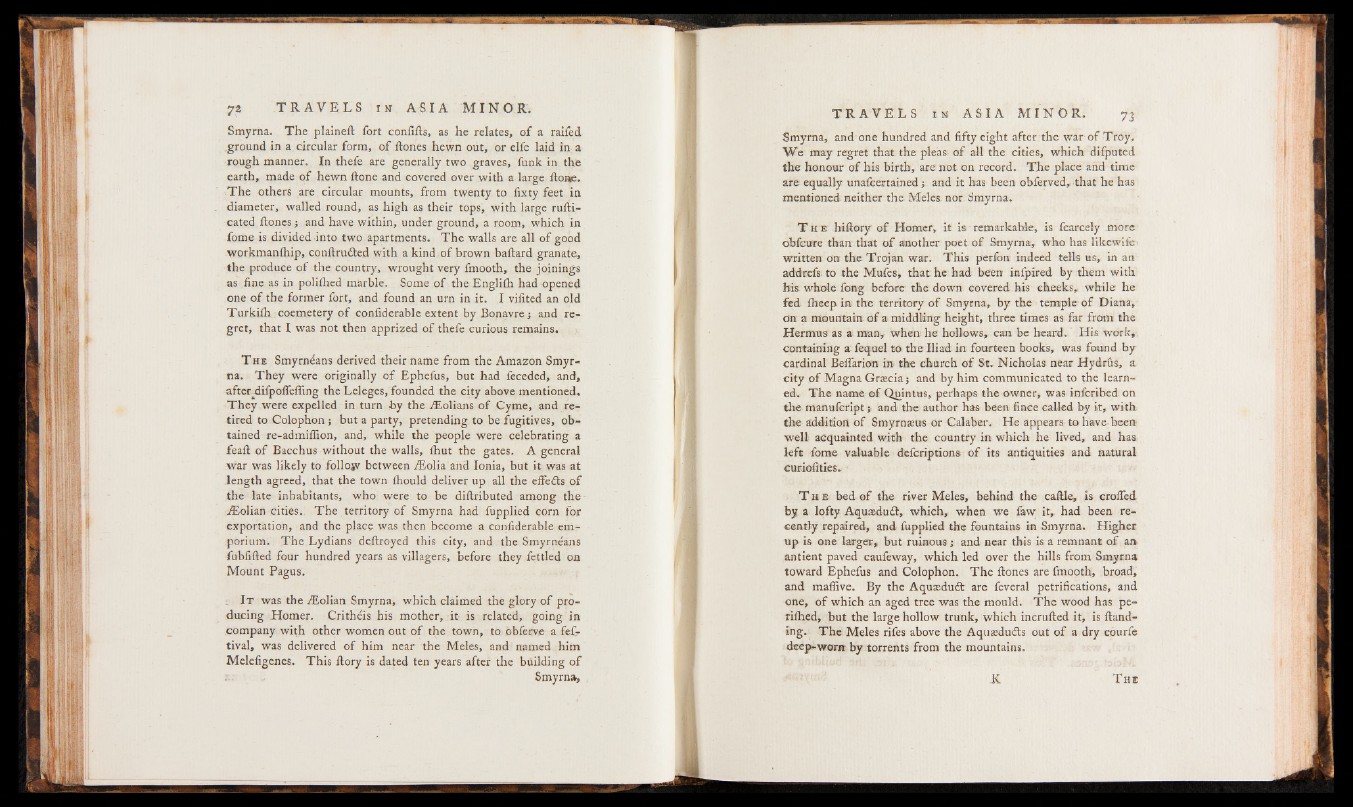
Smyrna. The plainefl fort confifls, as he relates, of a raifed
.ground in a circular form, of Hones hewn out, or elfe laid in a
rough manner. In thefe are generally two graves, funk in the
earth, made of hewn Hone and covered over with a large Hose.
The others are circular mounts, from twenty to fixty feet in
diameter, walled round, as high as their tops, with large rufti—
cated Hones j and have within, under ground, a room, which in
fome is divided into two apartments. The walls are all of good
workmanfliip, conflrufted with a kind of brown baflard granate,
the produce of the country, wrought very fmooth, the joinings
as fine as in polifhed marble. Some of the Englifli had opened
one of the former fort, and found an urn in it. I vifited an old
Turkilh coemetery of confiderable extent by Bonavre j and regret,
that I was not then apprized of thefe curious remains.
T he Smyrneans derived their name from the Amazon Smyrna.
They were originally of Ephefus, but had feceded, and,
after^difpoflefling the Leleges, founded the city above mentioned.
They were expelled in turn by the ALolians of Cyme, and retired
to Colophon; but a party, pretending to be fugitives, obtained
re-admiflion, and, while the people were celebrating a
feafi of Bacchus without the walls, fliut the gates. A general
war was likely to follojv between ALolia and Ionia, but it was at
length agreed, that the town fliould deliver up all the effedts of
the late inhabitants, who were to be difiributed among the
AEolian cities. The territory of Smyrna had fupplied corn for
exportation, and the place was then become a confiderable emporium.
The Lydians deflroyed this city, and the Smyrneans
fubfified four hundred years as villagers, before they fettled on
Mount Pagus.
I t was the fEolian Smyrna, which claimed the glory of producing
Homer. Critheis his mother, it is related, going in
company with other women out of the town, to obferve a fef-
tival, was delivered of him near the Meles, and named him
Melefigenes. This Hory is dated ten years after the building of
Smyrna,
73
Smyrna, and one hundred and fifty eight after the war of Troy,
We may regret that the pleas of all the cities, which difputed
the honour of his birth, are not on record. The place and time
are equally unalbertained ; and it has been obferved, that he has
mentioned neither the Meles nor Smyrna.
T he hifiory of Homer, it is - remarkable, is fcarcely more
obfeure than that of another poet of Smyrna, who has likewife
written on the Trojan war. This perfon indeed tells us, in an
addrefs to the Mufes, that he had been infpired by them with
his whole fong before the down covered his cheeks, while he
fed fheep in the territory of Smyrna, by the temple of Diana,
On a mountain of a middling height, three times as far from the
Hermus as a man, when he hollows, can be heard. His work,
containing a fequel to the Iliad in fourteen books, was found by
cardinal Beflarion in the church of St. Nicholas near Hydras, a
city of Magna Græcia ; and by him communicated to the learned.
The name of Quintus, perhaps the owner, was inferibed on
the manufeript ; and the author has been fince called by it, with
the addition of Smyrnæus or Calaber. He appears to have been
well acquainted with the country in which he lived, and has,
left fome valuable deferiptions of its antiquities and natural
curiofities.
T he bed of the river Meles, behind the cafile, is croffed
by a lofty Aquædudl, which, when we faw it, had been recently
repaired, and fupplied the fountains in Smyrna. Higher
up is one larger, but ruinous ; and near this is a remnant of an
antient paved caufeway, which led over the hills from Smyrna
toward Ephefus and Colophon. The Hones are fmooth, broad,
and maffive. By the Aquasdudt are feveral pétrifications, and
one, of which an aged tree was the mould. The wood has pe-
riflied, but the large hollow trunk, which incrufled it, is Handing.
The Meles rifes above the Aquæduéts out of a dry courfe
deep-worn by torrents from the mountains.
K T he